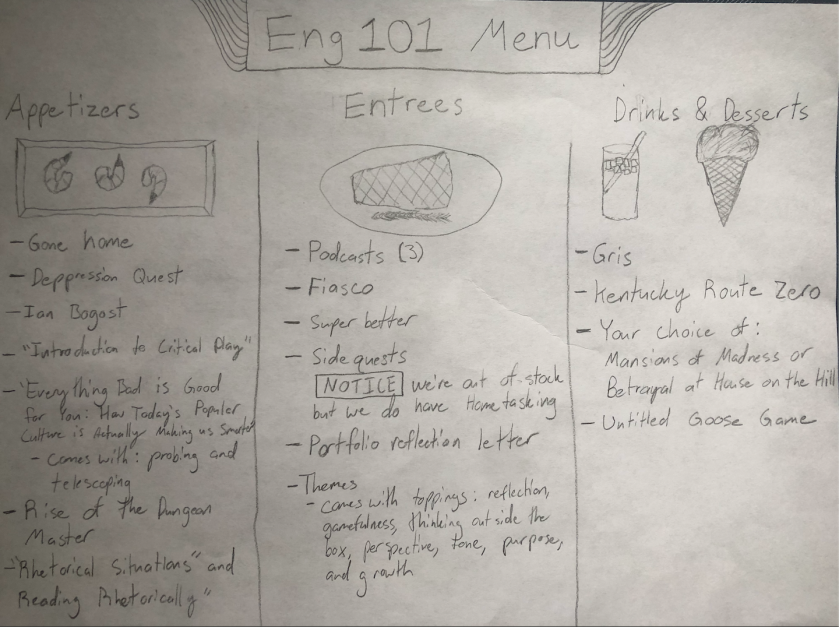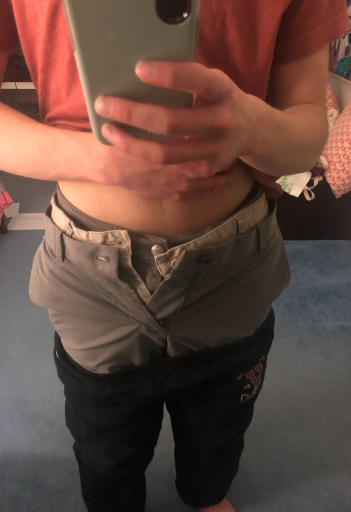Reflecting on a Fruitful Semester

Note: this site is an archive of the work produced by Winslow Wanglee over the course of the spring 2020 semester at Emory in English 101
Throughout my semester in Professor Morgen’s English 101 class, I have thoroughly developed my skills as a writer in ways I could not have foreseen. The unique structure of the class encouraged me to break boundaries in my writing, challenging the structured dogma writing that I had been taught throughout my K-12 education. No longer were we writing bland five paragraph essays. Instead, we explored alternative forms of media, such as podcasts, sidequests, and blog posts, opening new pathways for literary expression. Most importantly, I fulfilled all five of the learning outcomes for the class: rhetorical composition, critical thinking and reading resulting in writing, writing as a process, collaboration, and digital citizenship.
I utilized the introductory texts to form a framework for my writing for the remainder of the class. In Everything Bad is Good for You: How Today’s Popular Culture is Actually Making Us Smarter, Steven Johnson talks extensively about the concept of probing, where a player figures out how to play a game through trial and error. I used this concept in my own podcast Minecraft: A Trip Back Through Time, where I say, “As I was playing, I used a bit of probing to create items,” discussing how probing was a tool I used to rediscover the game. I used Johnson’s term and applied it to my own experience playing Minecraft. Another important concept I utilized throughout the semester was the act of thinking gamefully, which Jane McGonigal described in her books SuperBetter and Reality is Broken. To be gameful is to wrestle with the game’s limitations, to play until we exhaust the challenge of the game. Because of Jane McGonigal I tried to think gamefully, exhausting the challenge for whatever game I played. In my Fiasco reflection, I write, “I tried to develop the emotional strengths and weaknesses of my character: in my first scene, I described my ethical dilemma towards my gambling addiction, and how it was fueling my worst behavior and causing me stress. I also described the anxiety of being indebted to bloodthirsty loan sharks, and how that was driving the conflict for my character.” Fiasco is a roleplaying game, which means the best gamer is the one that creates the most multi-layered, thought-provoking story. In Fiasco, I played the full extent of the game by fleshing out the story and the emotional undercurrents as best as I could, effectively incorporating gameful tactics into my writing and play.
My podcast series employed writing as a process of revision, editing, and reflection, while simultaneously supporting collaboration with my peers to work in various rhetorical compositions. I began the process for my Minecraft podcast by writing an outline for my desired theme about nostalgia in video games. Meeting with Professor Morgen helped me revise my idea into a more practical approach where I discussed how Minecraft in particular changed the way I thought as a kid, while briefly discussing the effect of nostalgia. Instead of having it mostly scripted, I also changed the structure to having more moments of discussion between me and my associate producer. I collaborated well with both of my partners when making our podcasts, managing to bounce ideas off them and facilitate discussion. We divied up the work fairly and found the time to work together. After we recorded, I edited the podcast extensively on audacity, deleting awkward pauses and adding music where needed. This process not only strengthened newfound editing skills, it also showed me how to be a good digital citizen; I only used creative commons music and images for my podcast, making sure not to steal intellectual property. After completing the episode I wrote a reflection of the process and accomplishments of the podcast, thus finishing the process of writing successfully.
The diversity of texts I have created illustrate the new and adaptive rhetorical compositions that I’ve learned throughout English 101. From completing and reflecting on sidequests to creating podcasts using digital and audio tools, I’ve composed texts in many different ways. While previously my works could only be seen by myself and the teacher, from the beginning of the semester I published each reflection and sidequest on my website winslowwanglee.wordpress.com for all to see. Maintaining good digital citizenship, I made sure to credit all sources in my posts. I made sure I understood the purpose and constraints for each post, with some of the sidequest assignments including comedy, such as when I described the contents of my bag, saying, “1 Book (SuperBetter, for eng 101 class, duh); 1 Calculator to get me through Chem 202”. I reserved these playful, comedic moments for some of the smaller assignments while retaining a more serious, analytical approach to the larger reflections for my podcasts or fiasco, demonstrating my knowledge for the purpose of each text. In creating my podcasts with peers, I made sure to incorporate a mixture of scripted and conversational moments, to create an analytical argument that was both structured and contained the more intimate flow of a conversation. The introduction and conclusion were scripted to emphasize the thesis of the podcast in a succinct manner, while the middle of the podcast involved the conversation where the other producer and I fleshed out the podcast’s argument based off of an outline we created. This structure exhibited my recognition that the audience and purpose of a podcast is distinct from a standard analytical essay or reflection; while the podcast is still making an argument, it’s done in a more colloquial way through dialogue between two people, whereas the structure of an essay wouldn’t translate well to that form of media.
The process of hometasking personally helped me transition from an in-person to a virtual learning environment by assuring me that I am not, in fact, alone. Whenever I was tasked to complete a hometask, I could always look to my peers or the other thousands of people hometasking for inspiration. Although I was isolated from my peers physically, I could still gain power ups from my allies to help me complete my tasks, in the words of Jane McGonigal. I managed to defeat the bad guys, including sadness and Covid-19, to collaborate with my peers in online class by discussing our hometasking quests.
My learning inside the class translated wonderfully into my other classes here at Emory. I began to understand the importance and effect of rhetorical composition in my research. For example, in my business economics class I was instructed to describe the macroeconomics of the coronavirus recession as my final paper. During my research, I found that data charts and graphs were the best ways of rhetorically conveying my evidence, and frequently used them to supplement my writing. The graphs are often easier to understand by the reader and incorporate a more diverse rhetorical composition to my essay. Not only did I present this data, I analyzed it by emphasizing the abrupt changes in the economy between February and March 2020 in order to strengthen my argument. English 101 has improved my rhetorical skills both inside and outside the class.
Over the course of the semester, I’ve expanded my repertoire to include novel methods of writing while improving my proficiency in all the learning outcomes. One of my last tasks, entitled The English 101 Menu, illustrated how different parts of the class built off each other to accomplish my learning goals. The appetizers were mainly the early readings, which laid the foundation for the rhetoric of this class. The drinks and desserts are the collaborative games that we played which built my camaraderie and teamwork with the class. Finally, the entrees are the main projects of this class, such as the podcasts and the sidequests, which enabled me realize my full, diverse, rhetorical potential. As the semester comes to an end, I hope to use this menu of delights from Professor Morgen’s class to draw inspiration and impetus for future work.
To find more about David Morgen’s class, https://eng101s20.davidmorgen.org



